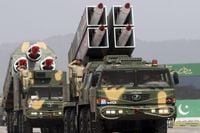In a move that has sent shockwaves through the corridors of power from Islamabad to Riyadh and beyond, Pakistan and Saudi Arabia have inked a landmark mutual defence pact, transforming their decades-old military partnership into a formal alliance. The agreement, signed on September 17, 2025, formalizes what had long been an open secret: the two nations’ security interests are now institutionally intertwined, with an attack on one treated as an attack on both.
The timing of this pact is anything but coincidental. It comes hot on the heels of a series of dramatic events in the region—Israel’s strike on a Hamas compound in Qatar, a deadly India-Pakistan clash in May, and a bloody 12-day war between Iran and Israel in June. According to the Eurasian Times, even seasoned observers of Middle Eastern and South Asian affairs were caught off guard by the announcement. "Even those accustomed to dramatic developments in the Middle East and South Asia were caught off guard by the announcement," said Joshua White from the Brookings Institution.
Pakistan’s Defence Minister Khawaja Asif, in a much-anticipated interview with journalist Mehdi Hasan, described the deal as the "formalisation" of what was once a largely "transactional" relationship. Yet, when pressed on the most sensitive aspect—whether the pact now places Saudi Arabia under Pakistan’s nuclear umbrella—Asif dodged the question. He insisted, "such defence pacts are normally not discussed," and flatly rejected claims that Pakistan might sell nuclear weapons to the Kingdom. "No, I don’t believe that quote. We are very responsible people," Asif said, dismissing speculation about the Saudi crown prince’s supposed interest in buying nuclear arms from Pakistan as "sensationalised."
The ambiguity surrounding the nuclear dimension of this pact has only fueled further speculation. According to the Bulletin of the Atomic Scientists, Pakistan is believed to possess around 170 nuclear warheads, making it the only Muslim-majority nation with such capabilities. The question of whether this arsenal now stands at Riyadh’s disposal remains unanswered. Some Saudi and Pakistani sources have hinted at the possibility. As reported by AFP, a retired Saudi general, speaking anonymously, claimed, "We made it very clear and written that it includes the Pakistani nuclear weapons." Saudi analyst Ali Shihabi, who is close to the royal court, echoed this sentiment, telling AFP, "nuclear is an integral part of this agreement."
Yet, regional experts urge caution. Syed Ali Zia Jaffery from the Center for Security, Strategy and Policy Research at the University of Lahore told AFP, "Pakistan does not have any nuclear umbrella and there is just no evidence to suggest that Pakistan plans on providing one to Saudi Arabia. Pakistan’s nuclear doctrine, policy, posture, strategy, and capabilities are only India-centric." Bruno Tertrais from the Foundation for Strategic Research in Paris added, "It’s impossible to know the details of any potential arrangement in this area because that’s part of deterrence: what’s often referred to as strategic ambiguity."
The pact, experts say, builds on a foundation laid decades ago. Camille Lons, a Gulf specialist at the European Council on Foreign Relations, noted, "The pact clearly formalises and deepens decades of Saudi-Pakistani security and defence cooperation, building on a landmark 1982 protocol agreement." Over the years, Pakistan has provided training, advisory support, and even stationed troops in Saudi Arabia, with many Saudi officers trained by Pakistanis and Pakistani officers seconded to the Saudi Ministry of Defence.
But this new agreement marks a significant shift. No longer an informal arrangement, it is now a binding commitment. According to Dr. Imran Khurshid, an Indian security analyst writing for the Eurasian Times, "This pact transforms bilateral cooperation into an institutionalized framework with binding commitments. This shift means that in the event of a crisis involving Saudi Arabia—whether with Iran, Yemen’s Houthis, or in broader regional rivalries—Pakistan would be compelled to respond militarily." Khurshid warns that this is a "very dangerous" gamble for Islamabad, potentially drawing Pakistan into conflicts where its own national interests are marginal.
One complicating factor is the triangular relationship between Pakistan, Saudi Arabia, and India. Saudi Arabia, which maintains robust economic ties with India—its third-largest petroleum customer—has historically avoided entanglement in Indo-Pakistani conflicts. "Would Saudi Arabia get involved in an escalation between Pakistan and India? I don’t think so. That would go completely against the kind of diplomacy Saudi Arabia is trying to pursue—which, like India, is one of multi-alignment," Lons explained to AFP. Joshua White added, "Riyadh’s instinct would be to stay passive, preserving hard-won trade equities with India while honouring its security obligations to Pakistan. That balance will now be harder to sustain."
For Pakistan, the risks are manifold. The agreement could divert attention and resources from pressing domestic challenges and the ever-tense border with India, leaving the country more vulnerable to internal security threats. As highlighted in the Eurasian Times, Pakistan’s past alignment with U.S. policies during the "War on Terror" cost it nearly 90,000 lives—a cautionary tale for those wary of being drawn into foreign conflicts. The pact also exposes Islamabad to the risk of antagonizing Iran, Israel, and other regional actors, potentially making it a direct target in future Middle Eastern crises.
There are also practical constraints. Much of Pakistan’s military hardware—including U.S.-supplied F-16s—cannot be deployed in scenarios involving Israel or other U.S. allies without American consent. Chinese-supplied systems, meanwhile, are considered less reliable, and there is skepticism about Beijing granting permission for their use in sensitive operations. Asif, for his part, was unequivocal about Pakistan’s strategic orientation: "With China. They are reliable and they are our neighbours," he said, underscoring a partnership he described as "time-tested since the late 1950s." He accused the United States of being an unreliable partner, noting that Pakistan sources most of its weapons from China and that defence cooperation is "more robust than before."
The nuclear question, however, looms large. Pakistan’s history as a proliferator—most infamously through the A.Q. Khan network—has already raised international alarms. Any perception that Islamabad is extending a nuclear umbrella to Riyadh could revive these concerns, undermine the global non-proliferation regime, and provoke a dangerous arms race, especially with Iran watching closely. As Dr. Khurshid warns, "If Islamabad appears to make its nuclear umbrella available to Riyadh, it would revive those anxieties and set a dangerous precedent, encouraging Iran and others to seek similar capabilities."
On the home front, the pact has political implications as well. Asif defended the incarceration of former Prime Minister Imran Khan, insisting it was "as per law" and not political revenge, while accusing Khan of "3.5 years of misrule" and the arrest of "whole families" during his tenure. This rhetoric, some analysts suggest, is aimed at shoring up the government’s legitimacy at a time of public discontent and internal crisis.
Saudi Arabia, for its part, has sought to reassure the international community, stating that the pact is "purely defensive and not aimed at any third country." Nevertheless, India and other regional players are watching closely, wary of the pact’s potential to disrupt the fragile balance of power.
As the dust settles on this dramatic development, one thing is clear: the Saudi-Pakistan defence pact is not merely a formalisation of old ties, but a strategic gamble with far-reaching consequences. Its impact on regional security, nuclear stability, and Pakistan’s own internal challenges may be felt for years to come.




